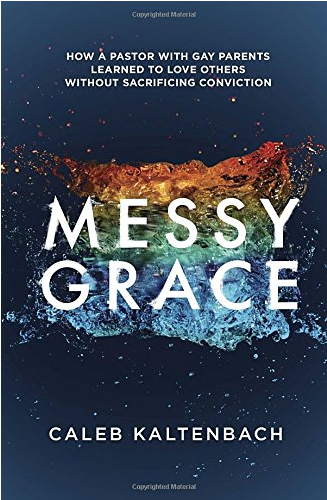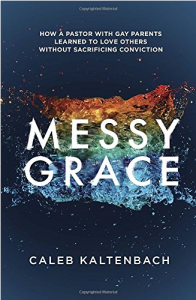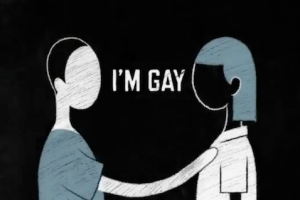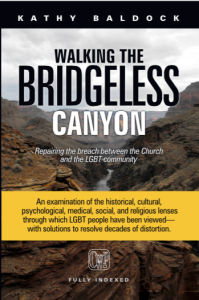Messy Grace: How a Pastor with Gay Parents Learned to Love without Sacrificing Conviction


Caleb Kaltenbach’s Messy Grace: How a Pastor with Gay Parents Learned to Love without Sacrificing Conviction (2015, WaterBrook Press) had been recommended to me as a compassion treatment of the intersection of faith and sexual orientation.
Kaltenbach’s book is one of the recent book offerings in latest genre of Christian authors extending what they perceive as a more merciful perspective on the lesbian, gay, bisexual and transgender (LGBT) community.
[ORIGINAL POSTED ON AMAZON]
I was hoping that Caleb Kaltenbach, raised by a lesbian mother and her partner, and a gay father and his partner, might have a heightened empathetic curiosity that would drive him challenge his views and look to resources outside the evangelical bubble.
I was disappointed.
Kaltenbach is the lead pastor of Discovery Church in Simi Valley, CA.
Much of his book is the narrative of his life with his parents, his own journey to faith, and subsequent interaction with his parents after he became a Christian, and later, a pastor.
Admirably, the author does offer fellow straight believers tips on interacting and relating to LGBT people. It really is unfortunate, however, that we Christians need to be reminded to treat others humanely, considerately, and with kindness.
Because social and medical understanding of sexual orientation, and cultural assimilation have changed radically in the past 35 years, year markers are essential to LGBT stories told in recent decades. Kaltenbach neglects to firmly anchor his story with such markers. I found the absence of a timeline distracting when trying to pinpoint conservative Christian responses to the LGBT community in the narrative.
The author tells the story of Westboro Baptist-type street preachers at a Gay Pride event in Kansas City in what might have been the 1980s. I imagine many readers silently assuring themselves they would never treat LGBT people like that.
Westboro and their ilk are surely part of the extreme fringe of Christianity. I have attended many pride events and know very few people who are as ugly and aggressive as street preachers at Pride events. Most of us have absolutely no problem being nicer than typical street screechers. So, while tsk-tsking at this low bar of behavior, the majority of us are let off the hook.
It is not their overt anger towards the LGBT community that is the bulk of the problem in the Christian church. I know far more Christians who are quietly dismissive of LGBT people. Those attitudes are indeed often more destructive. They want LGBT people to stop being LGB or T before they extended the fellowship of congregational inclusion.
Ironically, Kaltenbach encourages his readers to consider their own subtle negative attitudes, asking, “Have you used derogatory language to refer to gay people or their sexual preferences?” (Italics mine.)
“Sexual preferences” indicates active choice. It is a term from before the 1990s and well left there. Medical professionals, and the culture in generally, had rudimentary understanding of sexual orientation.
LGBT people have sexual orientations, not sexual preferences.
Referencing the book title, Messy Grace, Kaltenbach suggests readers “live in the tension of grace and truth.”
Perhaps I have misunderstood grace in my own Christian walk, but the grace I have been given at salvation and asked to extend to others is God’s grace. It is big enough to cover all sin for all humanity. While it may be hard to understand, it is not messy. It is actually well defined in its limitlessness.
We make grace messy is tying it up in our rules and our expectations.
Kaltenbach goes on to define love as “the tension between grace and truth.” Here is where I began to wince.
What is the “truth” of which he speaks and asks us to hold in tension with God’s limitless grace?
I am assuming the “truth” is the conventional view (only historically recently developed over the last 75 years incidentally) that the ancient writers of six key passages of Scripture depicting same-sex behavior were unquestionably referring to those who are same-sex attracted, gays, lesbians and bisexuals.
If this is the “truth” you hold in tension with God’s limitless grace, you will always and ultimately fail in Christlike treatment of the LGBT community.
Well, that was mighty direct!
The majority of the evangelical world, along with their conservative cousins, likes to plop 21st century perspectives onto the first century, or even further back in the 14 century BC. They tell us, in assurance, they have the correct interpretation of passages. They know the meaning of, context of, and audience to which these key texts were written.
I have a far longer explanation of why this is an inaccurate view.
I deal build a foundation of proof over a span of ten chapters in my book Walking the Bridgeless Canyon. Simply put, the same-sex behavior we read about in the Bible is presented as man on boy sex, sexual excess, and/or lust, or in the case of Sodom, rape—basically, in those passages, we read about men doing whatever they wanted to do sexually with their bodies with whomever they wanted to do it with (women, boys, slaves, prostitutes or rape victims). We always see either an age or power differential between the men and the sex partner.
Two people of the same-sex, of equal social status, in mutually loving, consensual, monogamous relationships were not culturally visible until the early 20th century. Such attractions were not even noticed until the end of the 1800s, and then, only in small medical environments. Culturally, same sex, equal-status couples crept into visibility by about the 1920s.
Truth might be better approached when we cease turning a blind eye to what every major professional medical and health care organization in the U.S. knows: a homosexual orientation is a normal variation of human sexuality.
Kaltenbach, admitting some people will not “be able to hold fast to what Scripture teaches on sexuality” (ie. they will not stop being gay) offers “another way” for LGBT people to enjoy Christian church inclusion – a life-long submission to celibacy.
Sometimes words scream off pages, and following is a prime instance.
At the opening of Chapter 9, Kaltenbach writes, “One thing I’m pretty sure we can all agree on is that God created us as sexual beings.“ Soon he effuses, “Thank you, Lord.” Three pages later, having covered his personal wrestling with the issue of faith and sexual orientation for many years, Kaltenbach has “decided” there is one option for people with same-sex attractions: celibacy.
He can enjoy sex, while gay people, per his theological understanding, must be celibate.
Frankly, married, sexually active heterosexual Christians who “lovingly” suggest a life of celibacy for others mystify me.
Kaltenbach recommends we “celebrate” celibacy because: a celibate life shows Jesus is enough to fulfill the life of a celibate; celibacy offers freedom to serve others that married people do not have, a freedom “to move wherever they want to live, and to focus on hobbies or talents,” and so much more.
Kaltenbach urges LGBT people to “put God’s call above your own preference.” There is that word again indicating the choice of sexual attraction.
Perhaps, time thinking about and wrestling with theology that imposes life-long celibacy on others (while simultaneously thoroughly enjoying sex yourself), might be better invested in relationship with LGBT Christians. With relational grounding, one might seek to understand why a growing number of LGBT Christians and their allies have come to fully affirming biblical views of life-long, monogamous, loving same-sex relationships and marriage.
As an aside, statistically married people with families live longer, happier lives than do single people. The sales pitch for celibacy is shallow.
Absolutely tragically, Kaltenbach suggests another option for gay people: get heterosexually married. “A loving heterosexual marriage could redeem same-sex feelings.”
Yes, there are stories of gay people being heterosexually married. Please consider however – sexual orientation has three parts: sexual identity (what I say I am), sexual behavior (what sex I have sex with), and sexual attraction (which sex I am naturally attracted to). Calling oneself straight and participating in heterosexual sex, does not mean the natural attractions are gone nor that one’s same-sex feelings are “redeemed.”
I wrote a chapter in my book Walking the Bridgeless Canyon entitled “Gay People Marry Straight People – Now What?” Ignoring natural sexual attraction is not a wise choice and will never “redeem” attractions that are not fully innate to a person. The stories are not encouraging. Let me make this simple: to a father of a cherished daughter – would you encourage your child to marry a man that says he “was” gay but is no more? If you would not want it for yourself, stop passing it off as God’s will for others.
That the witness of LGBT Christians appear to be all but entirely excluded from Kaltenbach’s book is sad.
What began to challenge my traditional evangelical sureness was relationship with LGBT Christians. In 2007, I was one of the first straight Christians to attend a Gay Christian Network Conference. Since then, I have come to meet thousands of LGBT Christians. Though it may be an uncomfortable concept to grasp for some, LGBT Christians are often the most accurate reflections of Christ I know.
Because I could see the witness of Christ in the lives of LGBT Christians, I was compelled to do the work to try to align what I thought the Bible said with what I could see before me in the lives of real people. This led me on a long journey to better understanding.
Ignoring the existence and authentic witness of LGBT Christians will result in incomplete and flawed theological conclusions about faith and sexual ethics as they intersects sexual orientation and gender identity.
********************************
While I respect the amount of time Mr. Kaltenbach has invested in writing Messy Grace along with the several decades spent thinking about the topic, I would encourage him to more diligently engage theological thought that does not exclude LGBT people.
There are a growing number of Christians along with excellent resources that hold to interpretation of Scripture that include our LGBT brothers and sisters in Christ.
We need to stop being ignorant about history, science and the testimonies of LGBT Christians. All can be most certainly aligned with the Word of God.
Ignoring this input has resulted in flawed ideology and theology, which has crippled our outreach to and inclusion of LGBT people.
We will never be able to reach LGBT people and their allies with God’s love and God’s grace if we remain lazy and insist that our severely flawed ideology is the “truth.”
We all lose. Tragically, we are missing out on the beauty, gifts and fuller image of God our LGBT brothers and sisters in Christ offer.
Rather than defining love as the tension between grace and truth, where grace is messy and truth is flawed, I suggest love might be more costly than nicely telling LGBT people what you believe the Bible says.
LGBT Christians at GCN
Perhaps in an effort to express authentic love, we could lay aside our sureness, reexamine the Scriptures anew in context, empathetically listen to our LGBT brothers and sisters, read in earnest well-researched, theological-supported, and historically accurately information we are not familiar with, and in humility that risks being wrong and losing favor within the evangelical/conservative bubble, ask the Spirit of God for eyes to see what we may have missed in arrogance and pride.
Christian writings about the LGBT community will never reflect the grace of God until it is unconditional; nor the truth until it brings into alignment an interpretation of Scripture that honors science, the natural world, and of the testimonies of LGBT Christian.
It’s going to get messy.




